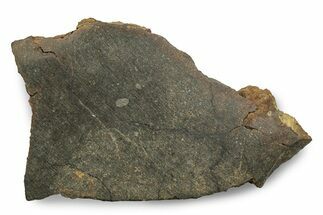This Specimen has been sold.
.61" Ait Saoun EH3/EH4 Chondrite Meteorite (2.01 g) - Fresh 2024 Fall!
This is a .61" wide (2.01 gram), fusion crusted, chondrite meteorite from a very recent, witnessed fall near Ait Saoun, Morocco. Based on initial analysis it will either be classified as a rare EH3 or EH4 type chondrite. It comes with a small acrylic display case.
The Ait Saoun Enstatite Chondrite
On the evening of August 6, 2024, around 10:45 PM, a brilliant fireball illuminated the night sky over Ait Saoun. The spectacle was both seen and heard, with locals reporting a loud explosion. This striking event drew attention across the Sahara Desert, leading to a major meteorite discovery the next day.
The morning after the fireball, hundreds of meteorite hunters quickly converged on the area. The discovery spurred a wave of activity, resulting in the recovery of about 2-3 kilograms of fresh meteorites over several weeks. Many of these fragments were small, with some displaying orientation and glossy, shimmering fusion crusts.
Initially thought to be a rare carbonaceous meteorite, further analysis identified the Ait Saoun specimen as an EH3/4 chondrite, a unique classification that enhances its value for studying early solar system materials. This makes it highly sought after by researchers and collectors alike. The classification is still pending official confirmation from the Meteoritical Bulletin but is expected to be updated soon.
On the evening of August 6, 2024, around 10:45 PM, a brilliant fireball illuminated the night sky over Ait Saoun. The spectacle was both seen and heard, with locals reporting a loud explosion. This striking event drew attention across the Sahara Desert, leading to a major meteorite discovery the next day.
The morning after the fireball, hundreds of meteorite hunters quickly converged on the area. The discovery spurred a wave of activity, resulting in the recovery of about 2-3 kilograms of fresh meteorites over several weeks. Many of these fragments were small, with some displaying orientation and glossy, shimmering fusion crusts.
Initially thought to be a rare carbonaceous meteorite, further analysis identified the Ait Saoun specimen as an EH3/4 chondrite, a unique classification that enhances its value for studying early solar system materials. This makes it highly sought after by researchers and collectors alike. The classification is still pending official confirmation from the Meteoritical Bulletin but is expected to be updated soon.
About Enstatite (E-Type) Chondrites
Enstatite chondrites are a rare type of stony meteorite that have a high concentration of the mineral enstatite, hence the name. They represent less than 2% of all meteorites that fell to earth.
All enstatite chondrites are mainly composed of enstatite-rich chondrules plus abundant grains of metal and sulfide minerals. Their oxygen isotopic compositions are intermediate between ordinary and carbonaceous chondrites, and are similar to rocks found on the Earth and Moon. Their lack of oxygen content may mean that they were originally formed near the center of the solar nebula that created the Solar System, possibly within the orbit of Mercury. Based on spectral analysis, it has been suggested that the M Type asteroids 16 Psyche or 22 Kalliope may be the common parent for Enstatite chondrites.
Enstatite chondrites are divided into two subtypes, EH and EL, based on their iron content. EH chondrites have a higher iron content, contain small chondrules and a high ratio of siderophile elements to silicon. Somewhat more than 10% of the rock is composed of metal grains. EL chondrites have a lower iron content and larger chondrules with a low ratio of siderophile elements to silicon.
Enstatite chondrites are a rare type of stony meteorite that have a high concentration of the mineral enstatite, hence the name. They represent less than 2% of all meteorites that fell to earth.
All enstatite chondrites are mainly composed of enstatite-rich chondrules plus abundant grains of metal and sulfide minerals. Their oxygen isotopic compositions are intermediate between ordinary and carbonaceous chondrites, and are similar to rocks found on the Earth and Moon. Their lack of oxygen content may mean that they were originally formed near the center of the solar nebula that created the Solar System, possibly within the orbit of Mercury. Based on spectral analysis, it has been suggested that the M Type asteroids 16 Psyche or 22 Kalliope may be the common parent for Enstatite chondrites.
Enstatite chondrites are divided into two subtypes, EH and EL, based on their iron content. EH chondrites have a higher iron content, contain small chondrules and a high ratio of siderophile elements to silicon. Somewhat more than 10% of the rock is composed of metal grains. EL chondrites have a lower iron content and larger chondrules with a low ratio of siderophile elements to silicon.
TYPE
EH3/EH4 Chondrite
LOCATION
Ait Saoun, Ouarzazate, Morocco
SIZE
.61" wide, 2.01 grams
CATEGORY
SUB CATEGORY
ITEM
#302416
 Reviews
Reviews













